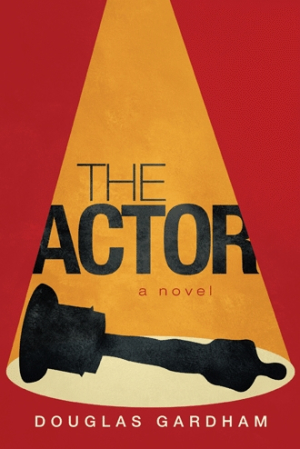The Actor
Gardham expertly weaves flashbacks, and the main character’s spotty memory, with parallel present-day scenes in this psychological mystery.
Ethan Jones can’t make up his mind. He planned on a dependable career as a mechanical engineer, but then Hollywood came calling. In his debut novel, The Actor, Douglas Gardham explores Ethan’s high-stakes decision to turn his back on a conventional career and instead chase his dream of stardom all the way to the Academy Awards. Part coming-of-age exploration and part psychological thriller—Ethan leaves a confounding trail of violence in his wake—The Actor puts readers in the hands of an unreliable narrator, leaving many threads unresolved until the final pages.
Gardham tells Ethan’s story in two different time lines, which makes for an intriguing puzzle. First is 1980s Ethan, a Canadian college student who falls in love with the beautiful and talented Mila Monahan and takes his first turn on stage at her prompting. He’s an immense talent, and they are a passionate couple, but things turn terribly wrong. Mila’s sudden disappearance throws Ethan into an unsteady fugue state that gets readers wondering exactly what happened. In alternating chapters, Gardham jumps forward to 1990s California, where Ethan determinedly climbs the ladder to cinematic success.
The chapters parallel each other, with Ethan’s relationships and performances echoing his earlier life. He’s back living with his old college roommate, Robbie, and falling passionately in love with a new woman, Christa, who, like Mila, meets a mysterious end. The repetition gets old, but readers who stick with it will see there’s a method to Gardham’s madness. He sprinkles enticing hints throughout, in the form of Ethan’s spotty memory and strange dreams about white rooms, wheelchairs, and hospital beds, but satisfyingly saves the resolution until the very end.
Several aspects of this first novel are inconsistently developed. Characters, for instance, are given uneven treatment. While Gardham fully explores Ethan’s psychology through inner monologues, for instance, he reveals little about Christa’s motives or nature. Female characters throughout tend toward glamorous stereotypes rather than fully formed personalities. Dialogue, too, has its strong and weak moments: Ethan and Robbie speak easily in the natural shorthand of longtime friends—“Dude, it’ll be okay”—but Ethan’s conversations with movie producer Sven are delivered in distracting dialect: “Zomezing vill vork out.” The same issue arises in description. Some passages hit the nail on the head, like the portrayal of an audition room through the eyes of an actor who has been to one too many seedy, back-alley auditions yet hopes this one will be the one. At other times, though, the book relies on clichés, particularly when articulating the longing of lost love: “If only he could hold her, touch her one more time, and share the moment.”
The Actor is a fairly long novel, but the continual switching between time periods keeps things active and keeps readers guessing. Gardham could tighten things up a bit by avoiding some of Ethan’s repetitive thoughts, though these play an instrumental part in the surprise ending. What can frustrate in the middle chapters turns out to satisfy in the end, when you find yourself saying, “Oh, I get it now.”
Reviewed by
Sheila M. Trask
Disclosure: This article is not an endorsement, but a review. The publisher of this book provided free copies of the book and paid a small fee to have their book reviewed by a professional reviewer. Foreword Reviews and Clarion Reviews make no guarantee that the publisher will receive a positive review. Foreword Magazine, Inc. is disclosing this in accordance with the Federal Trade Commission’s 16 CFR, Part 255.

